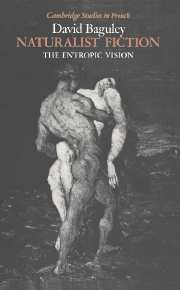Book contents
- Frontmatter
- Contents
- Acknowledgments
- Introduction
- 1 Histories
- 2 Theories: realism, naturalism, genre
- 3 The founding texts
- 4 The tragic model
- 5 Comic strains
- 6 In the ironic modes: naturalist satire and parody
- 7 The ‘scandal’ of naturalism
- 8 Naturalist description
- 9 The entropic vision
- 10 By way of conclusion: two English examples
- Notes
- Translations of passages in French
- Select bibliography
- Index
- Cambridge Studies in French
7 - The ‘scandal’ of naturalism
Published online by Cambridge University Press: 14 October 2009
- Frontmatter
- Contents
- Acknowledgments
- Introduction
- 1 Histories
- 2 Theories: realism, naturalism, genre
- 3 The founding texts
- 4 The tragic model
- 5 Comic strains
- 6 In the ironic modes: naturalist satire and parody
- 7 The ‘scandal’ of naturalism
- 8 Naturalist description
- 9 The entropic vision
- 10 By way of conclusion: two English examples
- Notes
- Translations of passages in French
- Select bibliography
- Index
- Cambridge Studies in French
Summary
Parody is perhaps not normally considered to be an aspect of the reception of literary texts. But parodies of naturalist works, unlike the parodic dimension of naturalist texts themselves that was explored in the previous chapter, being more overtly derisive, critical and corrective, clearly form part of the multifaceted process of reception. They could be said to fall into two distinct categories: on the one hand, those that are part of the polemical rejection of the genre in its incipient and successful stages, representing a counteractive commentary in a literary, derivative form directed against the themes and procedures of the literature under attack; on the other hand, those which occur at the declining stage in the evolution of the genre, exposing these same themes and procedures to ridicule as mere conventions and stereotypes or, as we shall see in the conclusion of this book, incorporating them negatively into works written according to new conventions.
Clearly parodies of the first type are useful pointers to the precise nature of the literary, social and ideological codes that the innovative literature has violated. One rather elaborate example may suffice to illustrate the point. Nana, like any significant work, is, as we know, a complex ‘hypertext’ arising from the imitation, adaptation, transformation and exploitation of a variety of previous works and models, ranging from burlesque works to more prestigious texts in the tradition of the literature on the life of the courtesan, ‘les Marion Delorme, les Dame aux Camélias, les Marco, les Musette’.
- Type
- Chapter
- Information
- Naturalist FictionThe Entropic Vision, pp. 164 - 183Publisher: Cambridge University PressPrint publication year: 1990

